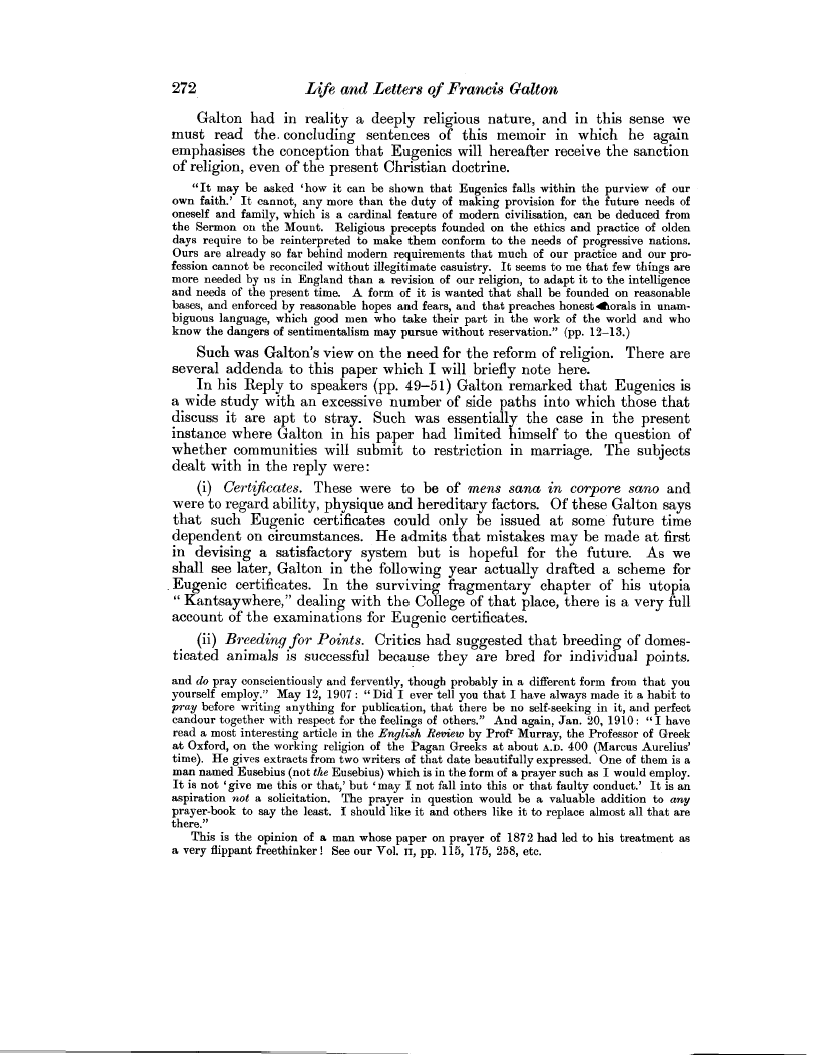| ||||||

OCR Rendition - approximate
272 Life and Letters of Francis Galton Galton had in reality a deeply religious nature, and in this sense we must read the. concluding sentences of this memoir in which he again emphasises the conception that Eugenics will hereafter receive the sanction of religion, even of the present Christian doctrine. "It may be asked `how it can be shown that Eugenics falls within the purview of our own faith.' It cannot, any more than the duty of making provision for the future needs of oneself and family, which is a cardinal feature of modern civilisation, can be deduced from the Sermon on the Mount. Religious precepts founded on the ethics and practice of olden days require to be reinterpreted to make them conform to the needs of progressive nations. Ours are already so far behind modern requirements that much of our practice and our profession cannot be reconciled without illegitimate casuistry. It seems to me that few things are more needed by us in England than a revision of our religion, to adapt it to the intelligence and needs of the present time. A form of it is wanted that shall be founded on reasonable bases, and enforced by reasonable hopes and fears, and that preaches honest orals in unambiguous language, which good men who take their part in the work of the world and who know the dangers of sentimentalism may pursue without reservation." (pp. 12-13.) Such was Galton's view on the need for the reform of religion. There are several addenda to this paper which I will briefly note here. In his Reply to speakers (pp. 49-51) Galton remarked that Eugenics is a wide study with an excessive number of side paths into which those that discuss it are apt to stray. Such was essentially the case in the present instance where Galton in his paper had limited himself to the question of whether communities will submit to restriction in marriage. The subjects dealt with in the reply were (i) Certificates. These were to be of mens sana in corpore sano and were to regard ability, physique and hereditary factors. Of these Galton says that such Eugenic certificates could only be issued at some future time dependent on circumstances. He admits that mistakes may be made at first in devising a satisfactory system but is hopeful for the future. As we shall see later, Galton in the following year actually drafted a scheme for Eugenic certificates. In the surviving fragmentary chapter of his utopia " Kantsaywhere," dealing with the College of that place, there is a very full account of the examinations for Eugenic certificates. (ii) Breeding for Points. Critics had suggested that breeding of domesticated animals is successful because they are bred for individual points. and do pray conscientiously and fervently, though probably in a different form from that you yourself employ." May 12, 1907: " Did I ever tell you that I have always made it a habit to pray before writing anything for publication, that there be no self-seeking in it, and perfect candour together with respect for the feelings of others." And again, Jan. 20, 1910: " I have read a most interesting article in the English Review by Profr Murray, the Professor of Greek at Oxford, on the working religion of the Pagan Greeks at about A.D. 400 (Marcus Aurelius' time). He gives extracts from two writers of that date beautifully expressed. One of them is a man named Eusebius (not the Eusebius) which is in the form of a prayer such as I would employ. It is not 'give me this or that,' but ' may I not fall into this or that faulty conduct.' It is an aspiration not a solicitation. The prayer in question would be a valuable addition to any prayer-book to say the least. I should like it and others like it to replace almost all that are there." This is the opinion of a man whose paper on prayer of 1872 had led to his treatment as a very flippant freethinker 1 See our Vol. ii, pp. 115, 175, 258, etc.
|